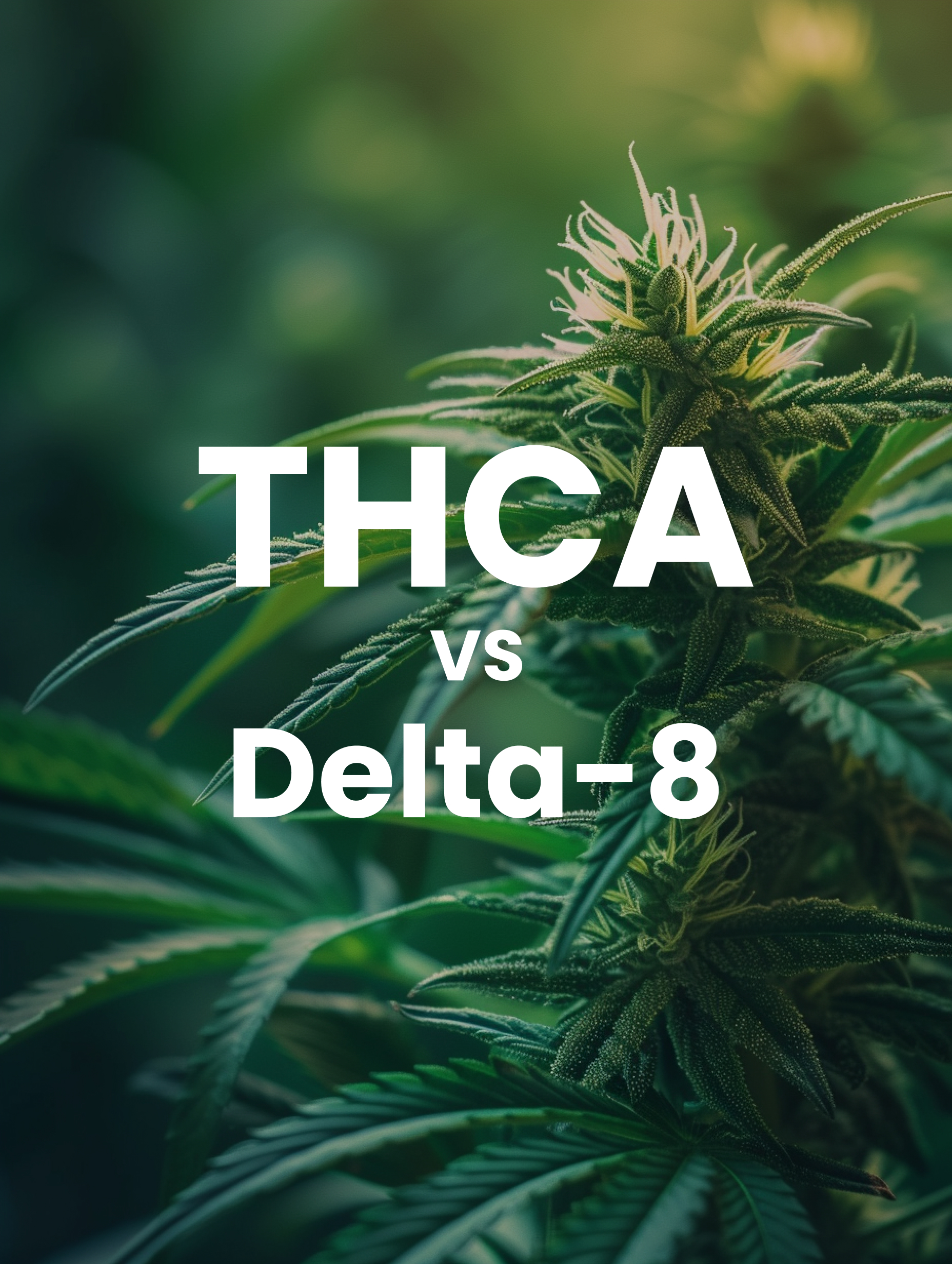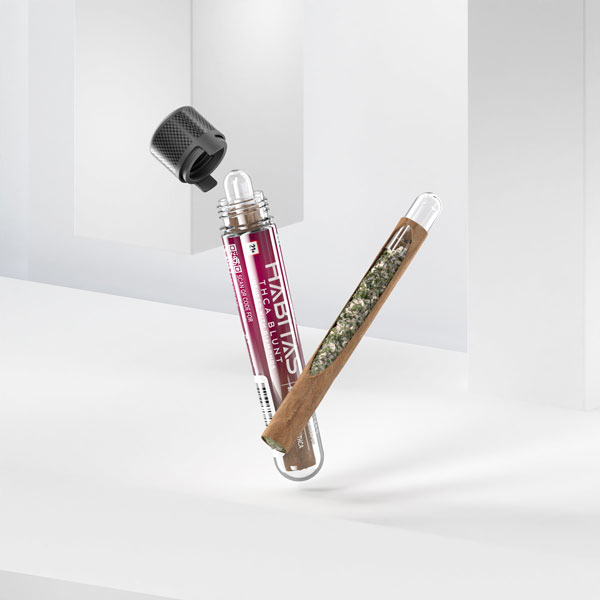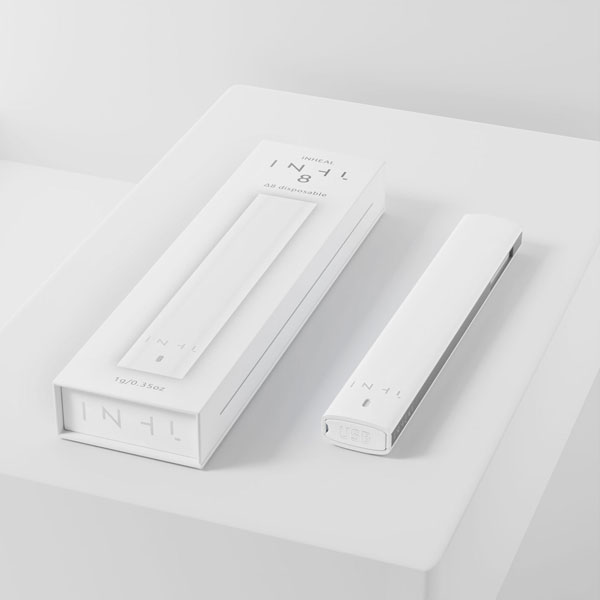THCA vs Delta 8: Differences and Similarities
Cannabinoids have become immensely popular in recent years for both recreational and medicinal use. As research on these compounds increases, these cannabinoids have generated significant interest among users and medical experts. This article provides a detailed comparison of compounds: their composition, effects, legal status, safety, and more – to help users make informed choices.
In short, comparing THCA vs Delta 8, both offer therapeutic benefits, but THCA transforms into a potent psychoactive compound when heated, while Delta 8 provides milder intoxicating effects useful for medical applications.


Key Takeaways
- THCA is the acidic form of THC. It occurs naturally in raw cannabis and converts into THC when heated.
- Delta 8 is a cannabinoid found in trace amounts in the cannabis plant. It’s similar to Delta 9 but with a slight difference in its chemical structure and with less psychoactive effects.
- When consumed raw, THCA provides therapeutic benefits but no high effects. However, when smoked it provides a potent THC high.
- Delta 8 provides a more functional and less potent high.
THCA can be used either medically, in the form of supplements, or smoked for recreational purposes.
Delta 8 can be infused in several types of products such as gummies, flowers, edibles, vapes, etc.
Understanding Cannabinoids: THCA and Delta-8 in Focus
Cannabinoids are compounds found in cannabis plants that interact with receptors in the human body and brain. They are behind many of the therapeutic and psychoactive effects associated with cannabis use. The two most researched cannabinoids are THC and CBD; however, lesser-known variants like THCA and Delta-8 also demonstrate promising health benefits.
THCA or Tetrahydrocannabinolic Acid is a precursor to the more commonly known THC. It occurs naturally in raw cannabis before decarboxylation into THC. Delta-8 THC is another minor cannabinoid that shares similarities with Delta-9 THC but differs slightly in chemical structure and effects. Comparing THCA vs Delta-8 allows users to make informed decisions based on their needs.
What is THCA?
THCA is the acidic, non-psychoactive precursor to THC found in raw cannabis. As plants mature, THCA converts into psychoactive THC through decarboxylation – exposure to light, air, or heat. In its raw form, THCA contains a carboxyl group not found in traditional THC.
According to user reports, potential effects and benefits of THCA may include:
- Anti-inflammatory
- Pain relief
- Anti-nausea
- Neuroprotection
To preserve THC-A and prevent decarboxylation into THC, manufacturers carefully extract it from cannabis plants using non-heated methods like cold ethanol and CO2 extraction. The THCA concentrate can then be used to create various wellness products. Consuming directly from raw cannabis flowers is also an option.
What is Delta-8?
Delta 8 THC is a minor cannabinoid chemically similar to the more known Delta-9 THC. However, Delta-8 naturally occurs in trace amounts in the hemp plant and must be concentrated from CBD to make commercial products. Many cannabis experts consider Delta-8 as ‘diet weed’ since it exhibits weaker psychoactive effects compared to traditional THC.
As users report, potential Delta-8 effects may include:
- Mild euphoria
- Relaxation
- Pain relief
- Improved appetite
- Anti-nausea
Delta 8 can be extracted from hemp plants but is more commonly synthesized from legal CBD to avoid federal regulations. Popular Delta-8 consumption methods include vaping, edibles, sublingual tinctures, and topicals.
Comparing THCA vs Delta 8
Now that we have a foundational understanding of THCA vs Delta-8 individually, we can compare some of their key attributes:
Effects
In raw form, THCA delivers no high and primarily therapeutic effects instead. However, when heated, it converts to the intoxicating compound THC. In contrast, Delta-8 does exhibit noticeable psychoactive effects, though considered less potent than Delta-9 THC.
Potency
Studies suggest THCA demonstrates positive medicinal effects at relatively low doses between 5-50mg. However, smoking or vaping turns it into a full-strength THC equivalent. On the other hand, users often double regular THC doses when taking Delta-8 to achieve similar highs.
Experience
Consuming raw THCA provides primarily therapeutic benefits without altering one’s state of mind. But heating THCA leads to potent psychoactive properties similar to traditional cannabis. Delta-8 gives users a more functional high that many describe as clearing brain fog and enhancing focus.
Extraction
THCA extraction uses non-heated methods to preserve its natural form found in raw cannabis. Delta-8 does not naturally occur in sufficient concentrations, so producers synthesize it from legal CBD instead.
Structure
The main structural difference is that THCA contains an extra carboxylic group. Losing this group through decarboxylation converts THCA into THC. Delta-8 shares a similar structure with Delta-9 but differs in the location of a double carbon bond.
In summary, both compounds share similarities but differ significantly regarding natural abundance, chemical structures, extraction methods, and psychoactive potency.
Legal and Safety Considerations
As hemp-derived products, they are legally under federal law, but regulations vary regionally. Consumers must research state and local laws before purchase.
Safety-wise, both compounds lack comprehensive clinical evidence. However, thus far, no serious side effects are uniquely associated with either substance except those typical of cannabis products. Like any hemp-derived compound, researchers call for more substantial trials to establish definitive security protocols.
Experts suggest beginning with low doses of any new cannabinoid and refraining from the compounds use altogether if drug testing concerns exist or medication contradictions persist. Furthermore, only purchasing from reputable sources can help mitigate potential contamination dangers from chemical processing methods.
Application and Usage: How Are They Used?
The applications depend significantly on intended use cases. Medically, THCA demonstrates therapeutic promise through supplements like oils and topicals or via juicing raw cannabis leaves. Recreationally, smoking or vaping decarboxylated THCA rich flower can offer intoxicating effects.
For Delta-8 products, manufacturers infuse it into various consumption formats, making edibles, tinctures, gummies, and vapes popular choices.
This versatility allows users to choose methods aligned with their requirements. Seeking relaxation or appetite stimulation may lead to Delta 8 edibles, while relief from nausea or inflammation may call for THCA pre rolls.
Open communication with medical professionals ensures safe and effective applications tailored specifically for each condition or individual.
User Experiences and Testimonials
Understanding genuine user experiences provides valuable perspectives on how THCA and Delta-8 work in practice.
- Craig H., 38, reports improved migraine symptoms from daily THCA supplementation without noticeable intoxication. However, vaping THCA flower instead provided potent psychoactive properties that significantly reduced her headache pain.
- Alternatively, Antony R., 19, preferred Delta-8 vape cartridges while studying as they offered euphoric effects that sharpened his creativity and concentration compared to traditional cannabis. He advises beginners to start slowly with Delta-8 as potencies between brands differ significantly.
By analyzing user testimonials, we can better understand real-world applications of both compounds. More research is still vital, but anecdotal reviews demonstrate promising medical and recreational applications thus far.
Future of THCA and Delta-8 Research
While current research remains in early stages, preliminary medical studies show encouraging results that warrant further investigation for both THCA and Delta 8.
For example, THCA demonstrates an ability to suppress nausea, stimulate appetite, decrease inflammation, and act as an anti-proliferative agent against certain cell types. These therapeutic properties may prove efficacious treatments for conditions like IBS, arthritis, neurodegeneration, and some cancers.
Of course, more robust clinical trials utilizing larger sample sizes and human participants will enable higher confidence around all health claims. But early findings paint an optimistic picture of the future of cannabis medicine as the industry matures.
Staying abreast of new studies through resources like informational sites and medical journals allows users to leverage the most cutting-edge applications of promising cannabinoids like THCA and Delta-8.
Final Thoughts
This guide provides a detailed overview of lesser-known cannabis compounds THCA and Delta-8. Analyzing attributes like effects, structure, research, and laws paints a clear picture of how these cannabinoids differ and what benefits they can offer users.
While full therapeutic potential remains unproven absent authoritative trials, consumer reports and preliminary research highlight promising medical applications for nausea, pain, neuroprotection, mental health, and more.
Critically, those looking to experience THCA’s effects recreationally must apply heat to experience the decarboxylated THC effects. In contrast, Delta-8’s psychoactive properties manifest without alteration, though considered less potent than common Delta-9 THC.
Still, with ever-evolving regional restrictions, staying mindful of changing legal precedents around these compounds proves vital as well.
Ultimately, when responsibly sourcing from reputable providers and combining with balanced lifestyles, both THCA and Delta-8 display significant wellness-boosting upsides worth exploring further as laws progress.
Also, you may like to read more about

Frequently Asked Questions
Is THCA or Delta-8 better?
The compound that proves ‘better’ depends significantly on the desired effects. Seeking non-intoxicating therapeutic relief may favor THCA, while recreational users would benefit more from Delta-8’s psychoactive properties.
Are THCA and Delta 8 safe?
Well-sourced cannabinoids pose no serious health threats thus far according to available research. However, both compounds need further clinical trials and oversight to be considered unequivocally safe for all users. For now, starting slow with low doses while avoiding drug interactions seems advisable.
What are the side effects?
In raw form, THCA has no known severe side effects, while Delta-8 may cause symptoms comparable to traditional THC like impaired motor function, dry mouth, bloodshot eyes, and anxious thoughts at high doses. Decarboxylated THCA converts to regular THC, taking on the same potential adverse reactions.
Can you fail a drug test after using consuming?
Likely yes – standard drug tests cannot distinguish THC compounds. So while THC-A itself does not cause failed tests, detectable THC metabolites persist for days or weeks after converted THCA use when smoked or vaped. Delta-8 may also trigger many common screenings.
Where can I legally buy them?
As hemp derivatives, both compounds are federally legal, albeit with stipulations. However, state legality still varies widely. Reputable national sellers like Inheal provide shipment to most states with compliant Delta 8 and THCA products. Still, double-checking regional and local policies proves critical before purchasing.
Citations
The statements on this blog are not intended to diagnose, cure, treat or prevent any disease. FDA has not evaluated statements contained within the blog. Information on this website or in any materials or communications from Inheal is for educational/informational purposes only and is not a substitute for medical advice, diagnosis, or treatment. Please consult your healthcare provider before making any healthcare decisions, correct dosage or for guidance about a specific medical condition.





